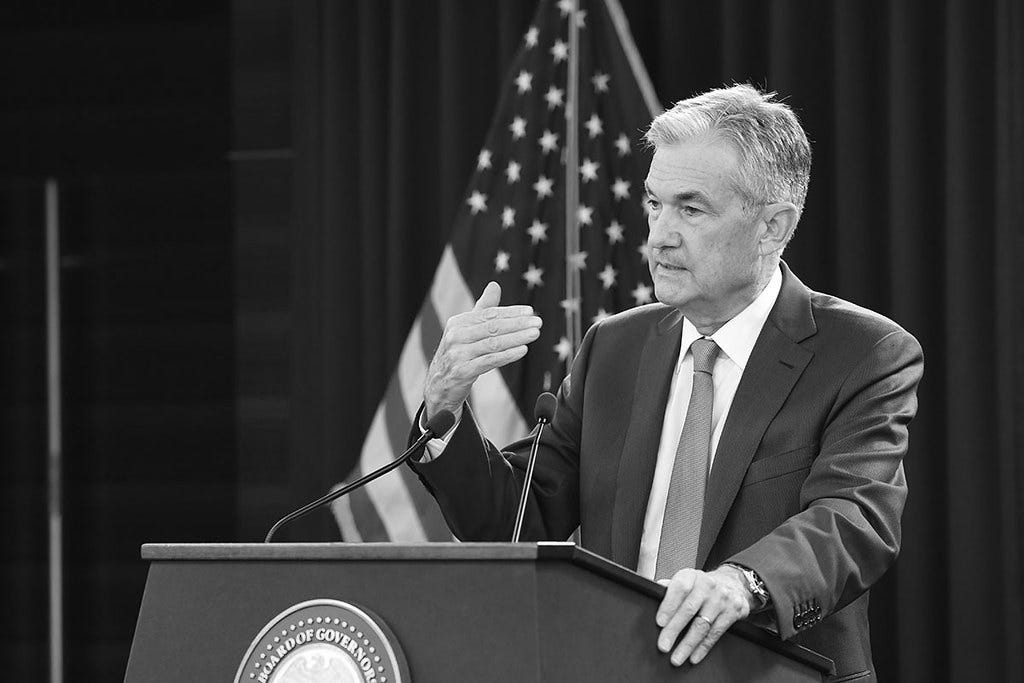Biting the Fed that Feeds You
The Art of the Bully
The person most responsible for Donald Trump’s recent election (outside of the hapless duo of Joe Biden and Kamala Harris, and the miserable Mr. Trump himself) is Jay Powell.
No one did more to bolster results on the ground during Mr. Trump’s first term than Powell, whom Trump appointed as Federal Reserve chairman in February 2018.
Recall the context: the U.S. was long past the financial crisis of 2008, but interest rates remained at crisis levels. As late as 2015, the Fed’s overnight loan rate was zero.
The free-money policy worked to resuscitate the banks, and it served to boost stock prices, but it didn’t do much for Main Street.
Growth in the Obama years was moderate, and in 2016 it tapered off to an unsatisfying 1.8%. By then, the Fed was (finally) starting to raise interest rates.
When Powell took office in 2018, growth had begun to revive. Powell continued the policy of slow but steady rate hikes--signaling that he would not allow inflation to cut short the incipient recovery. Trump squawked—and mused out loud about firing his Fed chief—but Powell persisted. He gradually hiked the overnight rate to 2.5%.
Voila! Economic growth spiked to 3% in 2018 (highest since the middle George Bush years), and a still-robust 2.6% in 2019. Wages rose at their fastest rate since before the financial crisis. Mr. Trump’s tax cut might have been expected to spark inflation, but thanks to Mr. Powell, inflation remained quiescent, meaning that wage gains enjoyed by workers led to real gains in living standards. Inequality, as measured by the Fed’s Survey of Consumer Finances, actually contracted, reversing an Obama-era trend.
By the time Mr. Biden defeated Mr. Trump, Mr. Powell had reduced interest rates back to near-zero, an effort to revive the economy out of its pandemic-induced shock. Mr. Biden’s fiscal policy was expansionary (big spending financed by big borrowing), as had been Mr. Trump’s. Unhappily for the 46th President, Mr. Powell now ignored that the Federal Reserve’s first duty is to preserve the value of the currency. Mr. Powell maintained a policy of virtually free money into 2022, well after voices here and elsewhere warned that the economy no longer needed such a massive infusion, and that inflation, once a threat, was becoming a potent reality.
Inflation soared to 8% in 2022 and remained over 4% the following year. By then, a chastened Mr. Powell was raising rates, but the damage was done. Over Mr. Biden’s first three years, after adjusting for inflation, household median income was essentially flat, compared with a positive 8% during Trump 1.0. When voters in 2024 said the economy had been better under Mr. Trump, that was the underlying rationale.
The political ironies warrant recapitulation: Mr. Powell served Mr. Trump by resisting his demands for cheap money, making him an (unwitting) success. Under Mr. Biden, Mr. Powell appeased the demand for a unitary pandemic government and indulged the White House with free money, which ultimately ruined Mr. Biden and plausibly the Democratic Party.
Historical aside: Presidents invariably treat crises (real or imagined) as a pretext for streamlining authority and eviscerating independent powers (Harry Truman used the Korean War to govern the Fed from the Oval Office; John Adams abridged speech over the non-threat of homegrown Jacobinism; Mr. Trump exploited “emergency” powers granted by Congress to impose punitive taxes on the non-emergency of steel imports from American allies.)
During his second term, Mr. Trump has rewarded Mr. Powell as he does anyone who serves loyally but not obsequiously –with unceasing threats, personal insults, and slanderous and baseless ruminations about possible fraud.
The President who has turned the White House into a crypto version of Home Shopping Network frets over a remodeling at the Federal Reserve. The President who extorted Paramount Global/CBS and pardoned the rioters who mobbed the Capitol thinks his every enemy is a lawbreaker.
The yawning irony is that Mr. Powell, rather than his enemy, and notwithstanding his slowness to act under Mr. Biden, is among the vanishing few federal officials who have withstood Mr. Trump and continue to serve the public good. In case the White House hasn’t noticed, the economy remains strong and inflation, though far from vanquished, is well below its former peak.
Were Mr. Powell to cut short-term rates—the only rates over which he has authority—from their current level of about 4 ¼% to 1% as Trump demands, the flood of money would lead to inflation, market angst, higher bond rates and a recession. If he were seen to be caving to a power-hungry executive, investors fearing a loss of the central bank’s independence, and its judgment, would surely sell American paper, making the above reactions worse.
Mr. Trump wants to replace Mr. Powell with a flunky, so that he can personally command lower interest rates just as he wishes to take charge of the course syllabi at Harvard and the naming of seas offshore Mexico. Then he can engineer a second inflation. To what end?


All true and well said. However, with Trump, one suspects it is not about policy but about his perverse pathological need to destroy that which he does not control.
This was a great read thank you